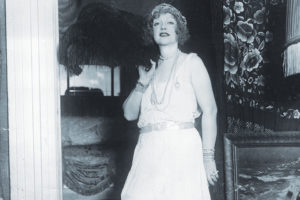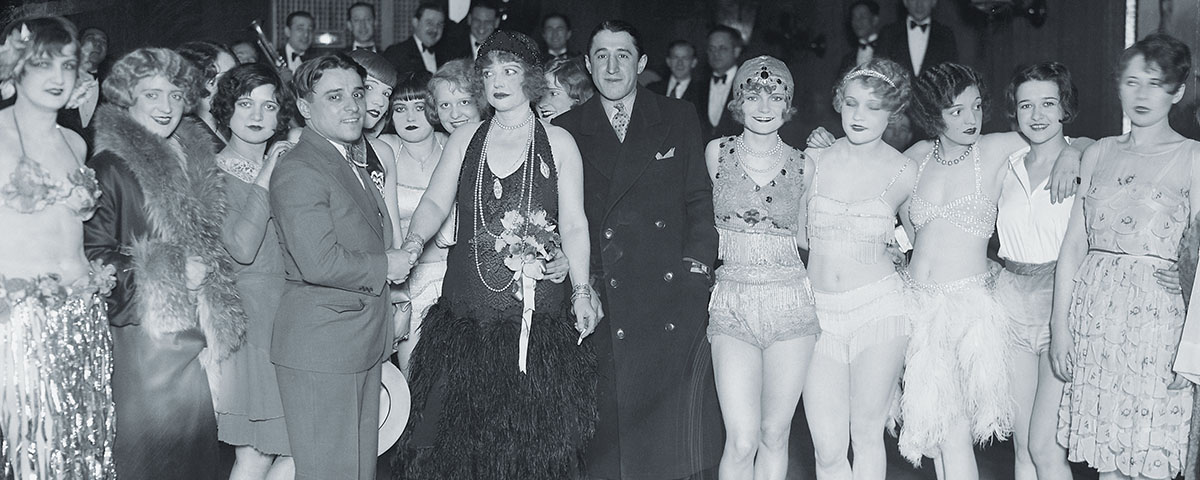She seldom arrived before midnight. By then, her Manhattan speakeasy was jammed with fans, half-soused or fully pickled, chanting “Texas! Texas! Texas!”
Texas Guinan let them beg until she sashayed in, décolletage decorated with pearls and a rose, diamond earrings and bottle-blonde hair framing a wide white grin. She’d perch atop the piano, pause, then bellow, “Hello, suckers!”
The suckers cheered. It was fun to be suckered by Texas Guinan. She was famous for that phrase, for her wisecracks, and for Prohibition busts that never led to convictions. The newspapers adored the woman reporters dubbed “Queen of the Nightclubs,” “mistress of Broadway’s high revel,” and “the Flaming Mamie of Gigglewater Gulch.” The sobriquet she coined was even better—“God’s Masterpiece.”
She was born in 1884 to Irish immigrants. “My real name is Mary Louise Cecilia Guinan,” she wrote in a semi-truthful memoir that the New York Evening Journal presented in 27 installments. “I was born on a ranch near Waco, Texas, a sucker town, so many years ago that it’s nobody’s business.”

She rode into showbiz in a Wild West show, then sang her way into vaudeville. “Miss Guinan has looks, and dresses well,” Variety noted in 1909. “Her well-trained soprano does the rest.” In 1917, Hollywood beckoned. She starred in silent westerns—The Gun Woman and The Girl Sheriff and She Wolf. “I could twirl a lariat, rope a steer, ride and shoot to beat any tobacco-chewin’ cowpoke,” Guinan bragged. Tiring of “kissing horses in horse operas,” she returned to New York to sing again.
By then, Prohibition had dotted Manhattan with illegal bars. One speakeasy, the El Fey, at 105 West 45th St., belonged to gangster Larry Fay. In 1924 Fay hired Texas Guinan as the El Fey’s hostess and emcee. Soon, the joint was jumping with show people, stockbrokers, hoodlums, tourists, and the reporters who made Guinan the It Girl of illegal fun.
Texas was 40, thrice married and thrice divorced. She didn’t drink—she cranked up with coffee and cigarettes—but she could keep a party going and customers spending.
“Miss Guinan’s particular function was to make whoopee,” one prosecutor told a jury. “She made everybody feel at home in a jovial way. There was entertainment, the silliest of songs and jokes and the thumbing of noses at the law.”
Well put. Texas would vamp, blare her signature line, then tell a joke, sing a song, toss noisemakers to the crowd. She’d introduce the band and the dancers—long-stemmed, barely clad beauties, many moonlighting from Broadway. “Give the little girl a great big hand!” Texas would yell as the ingénues shimmied about, popping cherries into tipsy male mouths. If the fun flagged, Guinan would bellow “Get hot!” or start a round of leapfrog or induce a drunk to embarrass himself. “There’d always be some extrovert in the club who could do a special trick like going down on his back with a glass of water on his head,” dancer Ruby Keeler recalled.
Guinan made every night New Year’s Eve. “You all feel good now,” she’d yell, “but wait `til your check comes!” That was a surefire laugh line. At El Fey, cigarettes cost ten times what they did anywhere else, and “champagne” that was really spiked cider was $25 a bottle. But the suckers appreciated Guinan’s candor.
“Lesson number one in Professor Guinan’s sucker psychology course is charge, charge, and then charge some more,” Texas said. “Of course, you’ve got to make ‘em like it.”
And they did. So many suckers jammed the speak that the dance floor shrank to the size of a welcome mat. The only wrinkle was John Law. The Volstead Act outlawed alcohol, of which the club sold plenty. Fay paid off the cops, but in March 1925 federal Prohibition Bureau agents raided and padlocked El Fey.
Within weeks, Fay opened the Del Fey, and Tex was back at it—until authorities padlocked that joint, too. Fay moved to 48th Street, uncorking the Texas Guinan Club. Word spread and, The New York Times reported, “her coterie willingly followed.” So did the feds.
When agents raided, Tex had the band strike up “The Prisoner’s Song.” She swore she was merely an entertainer and never sold, or drank,
a drop of booze. The club took a fall but Tex skated—wearing, newspapers noted, a necklace of tiny gold padlocks.
The crackdown drove Tex and Fay south to Miami, but she missed Broadway and in 1926 returned to emcee the 300 Club on West 54th Street. Secretly run by racketeer Owney Madden—proprietor of the Cotton Club, Duke Ellington’s home room—the Guinanized 300 lured 500 suckers a night, mostly high rollers. Texas was said to earn $2,500 a week.
Inevitably, the feds invaded—on Independence Day, as a great American golfer was celebrating his British Open victory.
“You’d be surprised if you knew the persons who were present,” Guinan told reporters at the station house. “We had two United States senators, a captain of a big British liner, and Bobby Jones.” She reopened within days, packing the room—until February 27, 1927.
“What, again?” Tex said when the agents intruded. “I hope I can ride in a taxi.” For her sixth bust, she did cab it to the precinct, in a fur coat. At trial, Guinan swore she didn’t drink and had no idea that the club served hooch.
“You didn’t think it was tea, did you?” the prosecutor asked.
“I don’t know—I don’t drink tea, either,” Guinan said. “I drink coffee.”
“Tex had a swell time,” the Chicago Tribune reported. “The jury had an even better time.” Maybe that’s why jurors acquitted her.
Now too notorious to work speakeasies, Texas recreated the speakeasy experience in a Broadway show, Padlocks of 1927. She portrayed herself in the 1929 talkie Queen of the Nightclubs and 1933’s Broadway Through a Keyhole. In 1931, she sailed to France with 33 lovelies eager to entertain Paris. The French turned them away, claiming too many native dancers were idle. American papers played the episode big. So did Tex. Dubbing her show Too Hot for Paris, she hit the road. Sometimes local censors banned Too Hot for its title alone, insuring boffo box office in the next town.
On November 4, 1933, Texas was playing Vancouver when she collapsed backstage. She died the next day of ulcerative colitis. She was 49. As her body returned to New York by train, her lawyer said Guinan had left her elderly mother $40,000, plus “a quart of diamonds and enough bracelets to fill a berry basket.” Texas Guinan’s final Broadway appearance—at Campbell’s funeral parlor, wearing gray chiffon with sequins—drew thousands.
“On her hands were diamonds as big as headlights—or at least they seemed to be diamonds,” the Daily News reported. “A detective from the pickpocket squad who stood in line to gaze on Tex expressed his doubts.”

